Three months ago, I flew from California to Uganda. Two days ago, I swore in as a Ugandan Peace Corps Volunteer. So much has happened in between: language learned and butchered, friendships forged, cultural faux pas made in abundance. I'd like to use this post to share my experience thus far.
The night of June 3rd, my parents drove me to the airport. The last supper in California was truffle pizza, roasted veggies, and a Moscow Mule: all things I'd dream about in the months to come. Afterwards, we met Brett's family at SFO and made a scene taking pictures and saying farewell. At the time, I was too excited to be sad. The concept of spending two years away was too large to contend with, so I shelved it for a later day.
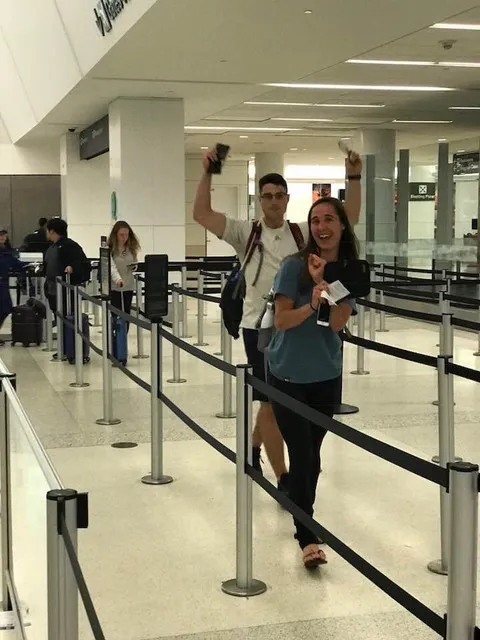
Brett and I landed in Philadelphia around 5 AM, and traveled to the Marriot Hotel for a full day of Peace Corps orientation. I remember walking into the hotel lobby and looking for facial hair, Chaco's, and dreadlocks. Instead I saw a room full of clean- cut professionals. (I'd later learn that three of the dudes chopped flowing locks and shaved successful beards to align themselves with Ugandan cultural norms) After hours of policy talk and ice breakers, 47 Peace Corps trainees poured out of the conference room and hit the town of Philly. A large group of us sought out Philly cheesesteaks and beer, and sat out in the humidity chowing down on our last supper in America. After a rowdy night at a local bar, I returned to the hotel for two hours of sleep before leaving for the airport. Instead of sleep, however, there was a final video chat with my best friend Johanna. Hearing her voice eased my anxiety, and I felt ready to embark on the journey.
It's funny now to think about that day. I knew so little about my 47 colleagues, and the family we'd become. I knew nothing about what I was getting myself into. I was wide eyed, curious, and optimistic. I hope to remain this way throughout my service.
Our first home in Uganda was at an agricultural college called Muzardi, near Mukono in Central Uganda. We stayed in "summer camp" style housing, the group of us split between three dormitories. We took our meals together around long banquet tables, and drank "break tea" twice a day. This was our first exposure to Ugandan food! "Food" in Uganda is the carbohydrate source, primarily matooke (a plantain- like dish), rice, potatoes, yams, and posho (a porridge made millet flour). Anything else is "sauce". Veggies, meat, soup, avocado. Sauce. Tell a Ugandan that you ate a salad for lunch and they will continue to ask, "But what food did you eat? Are you starving yourself?"
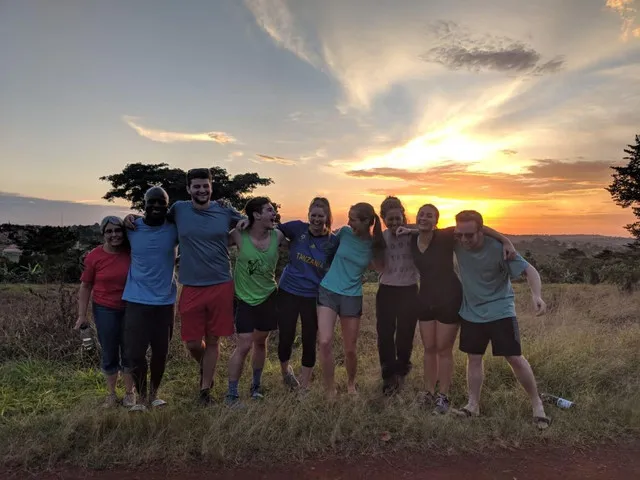
I loved it (most of the time), and still do after three months here. Produce is abundant and incredibly affordable; avocados cost 1/10 of a US dollar and are the size of footballs. Eggs come from chickens that roam the roads freely and the peanut butter is ground with sesame seeds and soy beans.
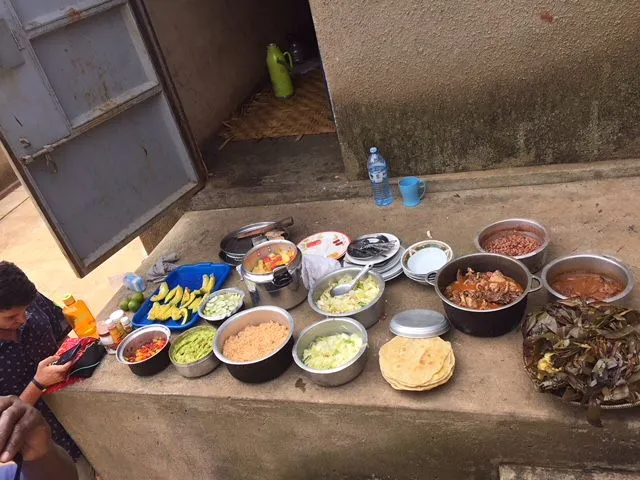
Now I'm drooling on my computer. Food aside... Our time at Muzardi was challenging, regimented, and jam- packed. Our days usually consisted of eight hours of lectures, on everything from Safety and Security policies to self- administration of malaria tests. However, we found plenty of time to goof off and grow to love each other. Most evenings, we watched stunning equatorial sunsets. We played soccer and volleyball and liar's dice. We learned to wash our laundry by hand and how to bathe out of buckets. I also became further acquainted with my introverted- extrovert self. I adore my cohort, but we spent 24/7 together for three weeks. I started getting up super early, just to exercise in total silence (and darkness). I craved decompression, and struggled when I couldn't find the space.
Despite these feelings, I've never felt more lucky. There's magic in our group, and it makes me sure of two things. One, that I'll stay connected to these individuals for the rest of my life. And two, that I can't wait to see where this adventure takes each of us.
I spent our last night at Muzardi with my head in a bucket, sick with my first GI infection (I'm told there will be many). The power was out and most people were out partying, so I was alone in the dark- crying, in the interest of full disclosure- when my friend Mikayla found me. She brought Brett and Camil, and the three of them made me laugh until I felt strong enough to crawl back to bed. All this in the true team spirit of our cohort.
The next morning, our cohort departed for disparate regions of Uganda. 13 of us remained in the Central Region, also known as the Buganda Kingdom. We stayed in Masaka with homestay families and learned the Luganda language. Brett and I stayed with a family of teachers. The father was a professor with a PhD in Psychology; the mother was a secondary school teacher pursuing a Psych PhD. They have three children, rear pigs and chickens, grow crops to sell, own rental properties, trade in Bitcoin... the list goes on. They hustle.
Every morning, Brett and I walked to the Masaka Social Center to meet our classmates and teachers for language training. We studied Luganda primarily through conversation. Our teachers forced us to generate original speech every day, and we learned quickly because of it. We learned that you cannot converse with a Central Ugandan without expressing gratitude for their work. Gyebaleko is one of the first phrases exchanged in any conversation. It means "thank you for all the work you've been doing", and is offered unconditionally. Whether you've been in hibernation or winning the Nobel Prize- gyebaleko.
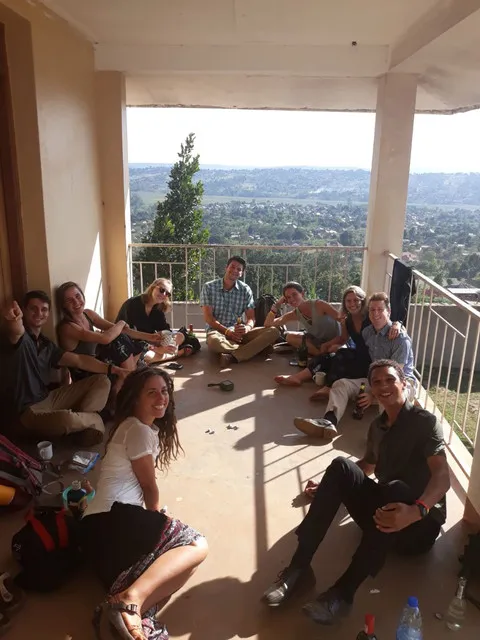
During this time, we experienced different examples of Ugandan households. We learned to cook on charcoal stoves, how to manage without electricity, and the value of extended families. We bought live chickens for our 4th of July BBQ, and butchered them ourselves. We learned that the price of a restaurant meal depends on how well you know the waitstaff; plates dropped from 3000 UGX to 1500 UGX over the course of our stay. I put on a Gomessi (traditional women's wear in Central Uganda) and attended a wedding ceremony. My host Maama wrapped a double layer of the fabric around me, claiming that I needed a bum in order to rock the dress. When I exclaimed, "I have one!", she mocked me- "not in Uganda, you don't."
We spent five weeks in Masaka, becoming more acquainted with the language and culture. The end of this period marked our eighth week in county, and we still didn't know where we would be working for the next two years. We were still gypsy vagabonds, living out of bags and in other people's space. We had no answer to our families' questions of, "but what will you do? where will you stay?" But finally, the great reveal... Brett and I would be working with an NGO called Reach Out in the Buikwe District!
Our final task before becoming Peace Corps Volunteers? A ceremony at the US Ambassador's home. The 47 of us reconvened in Kampala to celebrate our new roles. Each of the five language regions wore matching kitenge- fabric traditional to Eastern Africa. Our crew performed the Kiganda dance (with spirit, but not well), and representatives from each region gave speeches in the local language.
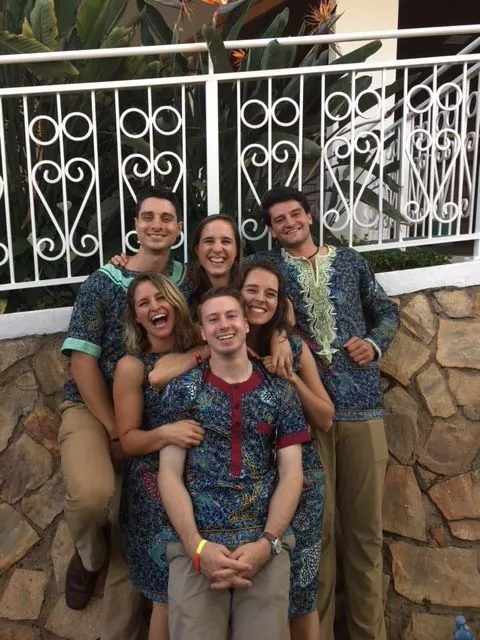
Finally, we took our oath. I stood between two of my closest friends, with goosebumps covering my arms. The last line was "I am a United States Peace Corps Volunteer". Who knew that all it took to become one, was to say it?
Three months down, two years to go... I'm more inspired and intimidated than I've ever been.